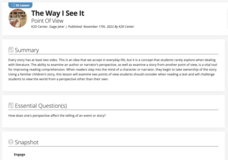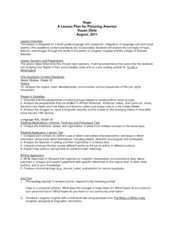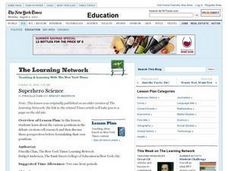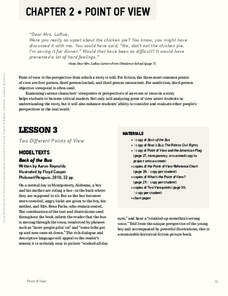Curated OER
Struggle for Equality
Learners read and discuss a selection of news clippings, sermons, and narratives that depict the continued struggle for equality and mistreatment of African American citizens. They present a "60 Minutes"-style news program with the...
University of Pennsylvania
Decoding Propaganda: J’Accuse…! vs. J’Accuse…!
Reading snail mail is a great way to go back into history and to understand others' points of view. The resource, the second in a five-part unit, covers the Dreyfus Affair. Scholars, working in two different groups, read one letter and...
Curated OER
War Poetry, Journals and Letters: Viet Nam
Examine letters written during war-time. In this cross curricular history and English lesson, middle and high school scholars read letters and poems written by soldiers in the Vietnam war. They will examine the perspective and emotions...
K20 LEARN
The Way I See It: Point of View
Robbers see a house from a different perspective than real estate agents. That's the big idea in a lesson about point of view. Groups assume the role of either robbers or real estate agents, note important details in a description of a...
University of North Carolina
Audience
Challenging pupils' perspectives by having them walk in the shoes of the reader. An informative resource discusses how to identify an audience and anticipate their needs before writing an upcoming argumentative essay.
EngageNY
Grade 10 ELA Module 3: Unit 1, Lesson 10
I know exactly how you feel. That may be a statement between Henrietta Lacks and John Moore. Scholars read John Moore's story and compare his story of cell use to that of Henrietta. Learners record in a vocabulary journal, analyze...
Curated OER
Sacred Places: California Missions from Different Perspectives
Learners create a project poster displaying photos, drawings, and journal writings that incorporate the major themes of California's missions, and use perspective and point of view both visually and in writing.
Idaho State Department of Education
Lessons for Social Studies Educators
Point of view, purpose, and tone: three concepts readers of primary and secondary source materials must take into account when examining documents. Class members view a PowerPoint presentation and use the SOAPS strategy to identify an...
Curated OER
American Perceptions of the Wilderness
Young scholars examine various American perspectives about the wilderness over time. In small groups they read and analyze writings by William Bradford and Frederick Law Olmsted, summarize the major points of each author, and write an...
Curated OER
Writing in Different Viewpoints
Students read and analyze the point of view of a selected classic short story. They take notes while reading the story, select a character, and rewrite the story from a different viewpoint.
Curated OER
What's My Point: Persuasive Writing
Why do readers need to know an author’s purpose? How do you figure out what that purpose is? Guide your pupils through a series of activities that show them how to identify various techniques and structures used in persuasive writing....
Curated OER
Picturing America: Images and Words of Hope from Romare Bearden and Langston Hughes
A carefully crafted three-day lesson integrates poetry and visual art. By analyzing and comparing Langston Hughes' poem "Mother and Son" and Romare Bearden's collage "The Dove," readers explore the theme of hope. The lesson activates...
Curated OER
Find The Hidden Message: Media Literacy in Primary Grades
Learners practice listening to and reading various types of media and text. In groups, learners use video, newspapers, magazines, and more to compare and contrast different types of information. They identify the differences between fact...
Curated OER
Historical Agency in History Book Sets (HBS)
Study historical events by combining the study of historical fiction and non-fiction. Learners read about true past events in historical fiction novels and then research non-fiction accounts of the same events. What are some differences...
Student Handouts
Examining Primary Sources: Rudyard Kipling, “The White Man’s Burden” (1899)
Combine literature and history with the poem "The White Man's Burden" by Rudyard Kipling. Pupils read the poem and answer four questions about the text.
Curated OER
Well-behaved Women [and Men] Seldom Make History
Students examine historical context. In this historical perspectives lesson, students read and discuss instructor-selected picture book biographies. Students then complete graphic organizers based on the challenges the main characters...
ReadWriteThink
Teaching Point of View With Two Bad Ants
What better way to explain the concept of point of view than from an ant's perspective! After reading Two Bad Ants, pupils identify the point of view of the ants by studying the text and pictures. Then, they fill out a...
Curated OER
Developing Dialogue
Why do people argue? Use the article "A Holiday Medley, Off Key" to discuss the struggles that interfaith couples face when choosing to celebrate certain holidays. Then, in small groups, encourage learners to write dialogues that...
Roy Rosenzweig Center for History and New Media
The Boston Massacre: You Be the Judge!
The importance of considering multiple perspectives of the same event is the big idea in this exercise that focuses on the Boston Massacre. Class groups examine photos of four depictions of the massacre, an English and an American...
Curated OER
Superhero Science
Young scientist explore the various positions in the debate on stem cell research and then discuss these perspectives before formulating their own positions. They must research the topic and beliefs that others have. They will also look...
Scholastic
Point of View
The point of view in a story can dramatically change the story itself. Focus on finding the points of view in various reading passages with a language arts packet, which includes fiction and nonfiction text.
Florida Center for Reading Research
Comprehension: Narrative Text Structure, Character Consideration
An activity work alongside a narrative text of your choice. With reading comprehension at its focus, readers complete worksheets covering character descriptions.
Curated OER
A Duck's Bill on Capitol Hill?
Use a list of environmentally related words to engage learners in a discussion about ecosystem conservation legislation. As a class, read "Aware of Political Ecosystem, Property Rights Advocate Embraces Conservation Plan." Then, present...
Curated OER
Can Scientists Discover a Limit to Discovery?
Is there anything left to discover? Evaluate opposing sides of the debate regarding whether or not there is a future for scientific discovery. Middle and high schoolers assess quotations from the articles included to evaluate claims and...

















![Well-behaved Women [and Men] Seldom Make History Lesson Plan Well-behaved Women [and Men] Seldom Make History Lesson Plan](http://content.lessonplanet.com/resources/thumbnails/268494/large/odqwmdy4lmpwzw.jpg?1414466400)







